Posts Tagged ‘Satanic Verses’
PEN Journey 7: PEN in Times of War and Women on the Move
PEN International celebrates its Centenary in 2021. I’ve been active in PEN for more than 30 years in various positions and now as an International Vice President Emeritus. With memories stirring and file drawers of documents and correspondence bulging, I am a bit of a walking archive and have been asked by PEN International to write down memories. I hope this personal PEN journey will be of interest.
Iraq invaded Kuwait August 2, 1990. When I picked up my 10-year old son from camp in the U.S. that summer and told him what had happened, his first response was: What about Talal and Alec? These were two of his good friends at the American School in London—one was son of the Kuwaiti Ambassador; the other was from Iraq. He quickly understood the consequences. Fortunately, both of his friends had been out of their countries at the time, though I don’t recall Alec returning to the American School that fall. When the bombs dropped on Baghdad in January, the American School went into lockdown. The older students were issued identity cards. The security force around the school multiplied. When Talal came over to play that winter, he was accompanied by two imposing body guards who stayed outside.
Though the fighting in Iraq concluded by the end of February, security in London continued. By the end of March, the war in the Balkans had begun. Both wars brought to a close the honeymoon many felt after the fall of the Berlin Wall.
For PEN, the outbreak of war in Iraq and in the Balkans led to the cancellation of the planned Delphi Congress and to the convening of conferences in Europe and a two-day gathering of PEN’s Assembly of Delegates and international committees in Paris in April 1991. Delegates from 39 PEN centers came together to conduct the business of PEN at the Société des Gens de Lettres de France which occupied the 18th-century neoclassical Hôtel de Massa on rue de Faubourg-Saint-Jacques in the 14th arrondissement of Paris. There were no literary sessions or social gatherings, or the usual simultaneous translation of proceedings. The business was conducted primarily in English with intermittent French, the two official languages of PEN. (Spanish was added a few years later as PEN’s third official language.)
The Gulf War, the ethnic conflict in the Balkans, the aftermath of the Tiananmen Square trials and the ongoing fatwa against Salman Rushdie predominated discussions in Paris and later in November at the 56th PEN Congress in Vienna. The Gulf War had resulted in increased numbers of writers imprisoned and killed in the Middle East and an increase in censorship. Resolutions condemning the detention and imprisonment of writers in Saudi Arabia, Syria, Israel and Turkey passed the Paris Assembly. Little information was available from Iraq. Another resolution in Paris sponsored by the two American centers expressed concern to the U.S. government and all U.N. member states over the restrictions placed on journalists during the war and urged a review of the ground rules for journalists in conflicts.
Turkey and China continued to hold the largest number of writers in prison, as has been the case for most of my 30-year involvement with PEN. At the time the Turkish government had announced an amnesty for approximately a third of the writers, and there was some hope they might release the additional 80, but new laws were also proposed that could be used against writers. In China where 87 cases were reported, the authorities had announced the end of investigations on the leaders of the June 1989 Democracy Movement. Most sentences were lighter than expected with credit given to human rights organizations like PEN who had kept up pressure.
However, this was not the case for Wang Juntao, a 32-year old academic and Deputy Editor of the Economics Weekly newspaper. In a letter to his lawyer published at the time in The South China Morning Post Wang Juntao explained why he had spoken as he had at the trial even though he knew his penalty would be more severe. “…Only by so doing can the dead rest in peace, since on the soil where they shed blood there are still some compatriots who take risks and speak out from a sense of justice in the most difficult circumstances…” His lawyers had been given just four days to prepare his defense. He was sentenced to 13 years in prison with four years subsequent deprivation of political rights for the crime of conspiracy to subvert the government and for carrying out counter-revolutionary propaganda and incitement. His lawyers pressed him not to appeal so his wife had to do so and was given only three days. The appeal was rejected. [In 1994 Wang Juntao was one of the prisoners the U.S. demanded be released as a condition for trade talks. He was released from prison for medical reasons and now lives in exile in the United States where he has studied and received advanced degrees from Harvard University and a PhD from Columbia University. PEN was among the organizations which lobbied for this release.]
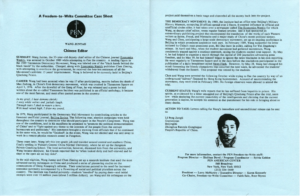
PEN International’s case sheet for Wang Juntao sent by fax and mail in 1990 to centers and members. In 1991 PEN International launched a Rapid Action Network to notify centers and to summarize the cases, actions and advocacy.
During this period PEN through its partnership with UNESCO convened writers in the Middle East and also writers in the Balkans to find common ground and to search out the pylons upon which bridges might be built and to monitor the situation for the writers in the regions. However, because of the Balkan War, it wasn’t possible to hold the meeting with the Yugoslav Centers in Bled as the Slovene Center had proposed. Instead PEN International President György Konrád hosted the gathering in Budapest and followed up with a meeting of South-Eastern European centers in Ohrid, hosted by Macedonian PEN though the Croatian Center wasn’t able to attend. The discussion included the desirability of recognizing the right of conscious objection in time of civil war and the possibility of solving the problem of minorities by allowing multiple citizenship.
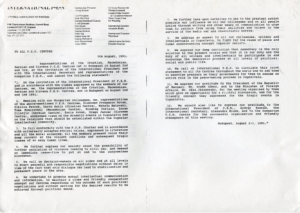
Summary statement of the August, 1991 Conference on the Balkans with all centers from the former Yugoslavia attending except the Bosnian Center, which didn’t come into being until the following year.
In addition to convening dialogues among writers and lobbying on behalf of threatened writers during the Balkan conflicts, PEN also provided financial assistance. Boris Novak, the Slovene Chair of PEN’s Peace Committee and President of Slovene PEN took many precarious trips into war-torn Sarajevo during the almost four-year siege of the city. At one point he reported at least 52 writers and their families were trapped and could only leave if invited to an international peace conference. Slovene PEN planned to host such a conference and invite the writers and their families with the hope the U.N. Peacekeeping Force could provide protection for their exit. He urged other PEN centers to assist in finding residences and perhaps temporary teaching appointments or fellowships for these writers. He also delivered aid to trapped writers, aid gathered from other PEN Centers, donated to the Writers in Prison Committee Aid Fund and to PEN’s Emergency Fund run out of Amsterdam with Dutch PEN.
In an intersection of conflicts, the German and Finnish publishers of Salman Rushdie’s Satanic Verses donated their proceeds from the book to PEN’s Writers in Prison Committee. By the Vienna Congress, Rushdie had lived 1000 days under death threat. PEN continued its defense of Rushdie and its protest against the accompanying violence of the fatwa. The Japanese translator of Satanic Verses had been killed, and the Italian translator badly beaten. (Two years later the Norwegian publisher was shot three times and left for dead.) The bounty had increased on Rushdie, and there was allegedly a hit squad deployed in Western Europe to assassinate him.
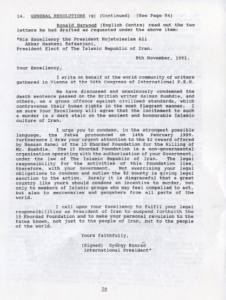
One of many letters sent by International PEN to support Salman Rushdie and to protest the ongoing fatwa.
My personal engagement and memories during this period focused on work with the Writers in Prison Committee and to a lesser extent with the formation of the Women’s Committee, which I supported but which others were driving, and with the establishment of the International PEN Foundation which would be able to receive tax exempt funds for many of these PEN activities. After a discussion of the Foundation’s framework at the Paris Conference, including assurances that the Foundation would not interfere or challenge PEN’s governance, I presented the formal proposal at the Vienna Congress where the Assembly of Delegates approved the establishment of an International PEN Foundation. The Foundation received official charitable status in March 1992 and operated for the next decade until British charitable tax laws changed and a separate foundation was no longer necessary.
Also at the Vienna Congress the Women’s Network, which had formed at the Canadian Congress in 1989, gained approval as a standing committee of International PEN with assurances that men and women were welcome and would work together. Meredith Tax, a chief strategist and one of the founders, explained the committee would involve more women in the work of PEN at all levels and address problems that particularly affected women writers in developing countries and would enable women to know each other’s work, much of which was not translated. “The Women’s Committee will be a force to strengthen, not weaken PEN,” she assured the Assembly.
The eventual governance of the Women’s Committee included PEN members from around the world and its chair rotated to different regions. Each of PEN’s standing committees had its own governing structure. The Women’s Committee was unique in its inclusiveness, which had its own challenges, but which foreshadowed a more inclusive governing structure for PEN International. Twenty-eight PEN centers signed up for the committee with 70 delegates and members, including men, attending the initial meeting.
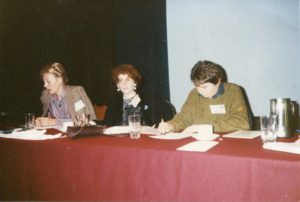
L to R: Moniika van Paemel, (Belgium Dutch-speaking PEN) and Meredith Tax (American PEN) at Women’s Committee Planning meeting at Canadian Congress, 1989
At the time International PEN’s leadership was all male. In its 80-year history International PEN had never had a woman President and only one woman International Secretary and few women as Committee chairs though in many centers of PEN there was a growing balance of men and women members and leaders. In 2015 novelist and poet Jennifer Clement was elected the first woman President of International PEN.
Next Installment: PEN Journey 8: Thresholds of Change…Passing the Torch
PEN Journey 1: Engagement
PEN International celebrates its Centenary in 2021. As Vice President Emeritus of PEN International and former International Secretary, former Chair of PEN International’s Writers in Prison Committee, former President of PEN Center USA West, board member and Vice President of PEN America and the PEN/Faulkner Foundation, I have been active in PEN for more than 30 years. With memories stirring and file drawers bulging with documents, I am a bit of a walking archive and have been asked by PEN International to write down some of the memories. I will try in digestible portions to recount moments, though I’m not certain how easily I can contain all these. I hope this personal PEN journey might be of some interest.
February 13, 1989: I was President of PEN Center USA West and on an airplane when I read that Salman Rushdie’s novel Satanic Verses was being burned in Birmingham. The next day a fatwa was issued on Rushdie. What was a fatwa, we all asked at the time, as we, along with PEN Centers around the world, mobilized to protest that a head of state was ordering the murder of a writer wherever he was in the world.
November 10, 1995: As Chair of PEN International’s Writers in Prison Committee, I was standing vigil with others outside the Nigerian Embassy in Washington, D.C. when word spread that novelist and activist Ken Saro Wiwa had been hanged that morning in Port Harcourt, Nigeria.
October 7, 2006: My phone rang at 7:30 on Saturday morning. I was International Secretary of PEN International, and the International Writers in Prison Program Director was calling to tell me that Anna Politkovskaya had just been shot and killed in Moscow. We all knew Anna—I’d last had coffee with her at an airport in Macedonia. We worked with her on the situation of writers in Russia and Chechnya and had enormous respect for her knowledge and courage.
January 19, 2007: We were about to begin a PEN International board meeting in Vienna when a call came from Istanbul. Hrant Dink had just been shot and killed outside his newspaper office in Istanbul. Dink was an editor of an Armenian paper and a writer whom members of PEN knew well and worked with on freedom of expression issues in Turkey.
Most writers long active in PEN’s freedom-to-write work can tell you where they were when the news broke on each of these cases. They can tell you because the lives of these writers and many others have been critical in the struggle for freedom of expression around the world.
In sharing memories of PEN, I begin with the writers and with the many friends around the globe who work on behalf of writers who don’t have the freedom to write without threat, imprisonment or death. As colleagues, we are bound together by the belief that truthful writing matters, be it journalism, fiction, poetry, drama, essays because stories and witnessing and creative imagination connect, inspire and shape us. Free expression is fundamental to a free society and is worth defending and expanding.

Salman Rushdie, Ken Saro Wiwa, Anna Politkovskaya, Hrant Dink
My own thirty plus years working with PEN began at a dinner meeting in Los Angeles in the early 1980’s. I was a young writer, new mother, former journalist who’d recently moved across the country from New York City where I taught writing at university and had friends and colleagues. I landed in the land of sun and Hollywood, and though I had a new college teaching job, I knew few people and even fewer writers. Like many who first seek out PEN, I came for the community.
My second meeting was at someone’s home where a presentation was made about writers in different parts of the world who were in prison because of their writing. I was introduced to PEN’s Writers in Prison Committee. At that meeting, we wrote postcards urging the Chinese government to release Wei Jingsheng, a writer who was imprisoned for “counterrevolutionary” activities, particularly for his essay “The Fifth Modernization” which he’d posted on the Democracy Wall in Beijing in 1978. His manifesto argued that as China was modernizing with four principles of modernization, it needed to include a fifth modernization–Democracy.
As I learned about Wei Jingsheng and the other writers on whose behalf PEN worked, I became more active in the PEN Center on the West Coast of America called PEN Los Angeles Center. I was elected President in 1988. Shortly after the election, I attended my second PEN International Congress in Seoul, South Korea right before the Olympics there. (The first Congress I attended was in 1986 in New York City, where our Center’s members were registered with the foreign delegates. I was active at that New York Congress in the Women’s revolution and the statement that came from the Congress.)
I arrived in Seoul late summer,1988 with our Center’s support for resolutions including one calling for the release of Wei Jingsheng and other writers in China, another resolution addressing writers in prison in South Korea, including our honorary member, publisher Lee Tae-Bok, and a resolution to change the name of PEN Los Angeles Center to PEN Center USA West. The name change had been passed by our center’s previous board but needed approval of the international Assembly of Delegates. It reflected our wider membership in the western part of the United States.
As president of PEN Los Angeles Center, I arrived as a young writer with a small delegation from Southern California, which included the former book editor of The Los Angeles Times and an English professor from UCLA. American PEN, based in New York, the largest of PEN’s more than 60 worldwide centers at the time was headed by Susan Sontag, president. American PEN didn’t want us to change our name and opposed our resolution on the floor of the Congress. While our two centers agreed on the other substantive issues of the Congress, including the problematic situation for writers in South Korea, and though we shared meals, the American PEN delegation, and Susan Sontag in particular, tried to get us to withdraw our name change, including a midnight call to me from Susan. The name change would be confusing, she said, and would take from the national scope of American PEN’s work. In that midnight call I listened to the arguments, then shared our thinking, which included the observation that our membership already came from many states west of the Mississippi, that in a country the size of the United States, PEN allowed more than one center, and for writers 3000 miles from New York, there was value in having more than one center of gravity. In the morning I presented American PEN’s arguments to my delegation, and we decided to go ahead and let our resolution go to the floor of the Assembly.
The representative from East Berlin noted: It would seem the East and West of America get along worse than the East and West of Germany. PEN Los Angeles Center’s resolution for a name change won by a wide margin, and we left the Congress as PEN Center USA West, which years later became PEN USA. I no longer live in Los Angeles but note that only in the past year –2018—did the members of the West Coast PEN decided to merge with PEN America in New York so there is now only one center of PEN in the US.
Most memorable and significant from the Seoul Congress was our delegation’s visit with the family of Lee Tae-Bok, our honorary member. “The house of Lee Tae-Bok’s parents is neat and spare, bedrooms with tatami mats on the floor, a living room with a sofa, a chair, a fish tank. There is no excess in the house, one senses out of choice. But there is an absence, not out of choice, for Lee Tae-Bok has been away in prison seven years. His mother worries that she will not see her oldest son out of prison before she dies,” I wrote in our Center’s newsletter. The family said that Lee Tae-Bok was in poor health and held in a cell four by five square meters, allowed out in the fresh air for only twenty minutes a day and wasn’t allowed to write except one letter a month to his family. His mother lamented the “hypocrisy” of the Korean government which had sentenced her son to life in prison because they said he published communist propaganda and yet they were greeting writers and “honored guests” at PEN’s Congress from Communist countries as well as inviting Eastern bloc athletes to Korea for the Olympic Games.
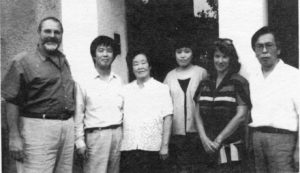
Digby Diehl and Joanne Leedom-Ackerman meet with the family of Lee Tae-Bok at the Lee home in Seoul in 1988.
In addition to our family visit, PEN Congress delegates petitioned the South Korean government on behalf of those in prison. A delegation from PEN International visited two of the writers in prison.
A few weeks after the Congress, notification reached us that Lee Tae-Bok had been released, though not everyone PEN spoke up for was released. I still remember where I was—I was in New York—when I heard the news, and I remember the elation. Many people worked on Lee Tae-Bok’s behalf so we couldn’t and didn’t take the credit, but we could feel some part of our actions, some push at the prison door helped spring it open. Release is not always the outcome for PEN’s work, but often it is. It is one of the goals. Over all my years in PEN, the release of a writer from prison still evokes a burst of hope and a measure of faith.
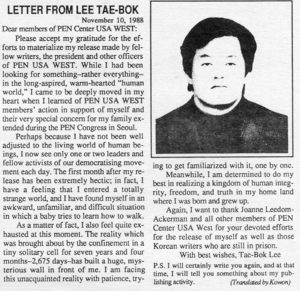
[Next installments: the watershed year 1988-1989 as the first global fatwa is issued against a writer, and writers and students in Tiananmen Square square off against China.]
Next Installment: PEN Journey 2: The Fatwa